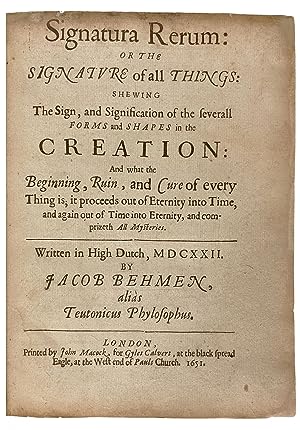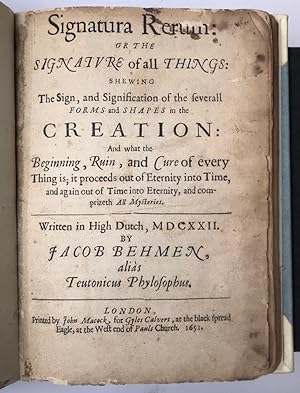signatura rerum signature things shewing de böhme jacob (3 résultats)
CommentairesFiltres de recherche
Type d'article
- Tous les types de produits
- Livres (3)
- Magazines & Périodiques (Aucun autre résultat ne correspond à ces critères)
- Bandes dessinées (Aucun autre résultat ne correspond à ces critères)
- Partitions de musique (Aucun autre résultat ne correspond à ces critères)
- Art, Affiches et Gravures (Aucun autre résultat ne correspond à ces critères)
- Photographies (Aucun autre résultat ne correspond à ces critères)
- Cartes (Aucun autre résultat ne correspond à ces critères)
- Manuscrits & Papiers anciens (Aucun autre résultat ne correspond à ces critères)
Etat En savoir plus
- Neuf (Aucun autre résultat ne correspond à ces critères)
- Comme neuf, Très bon ou Bon (Aucun autre résultat ne correspond à ces critères)
- Assez bon ou satisfaisant (Aucun autre résultat ne correspond à ces critères)
- Moyen ou mauvais (Aucun autre résultat ne correspond à ces critères)
- Conformément à la description (3)
Particularités
- Ed. originale (1)
- Signé (Aucun autre résultat ne correspond à ces critères)
- Jaquette (Aucun autre résultat ne correspond à ces critères)
- Avec images (3)
- Sans impressions à la demande (3)
Langue (2)
Prix
- Tous les prix
- Moins de EUR 20 (Aucun autre résultat ne correspond à ces critères)
- EUR 20 à EUR 45
- Plus de EUR 45
Livraison gratuite
- Livraison gratuite à destination de France (Aucun autre résultat ne correspond à ces critères)
Pays
Evaluation du vendeur
-
Signatura rerum, or, The signature of all things shewing the sign and signification of the severall forms and shapes in the creation, and what the beginning, ruin, and cure of every thing is. And other writings. by Jacob Behme. (Reprint from 1656).
Edité par Kessinger Publishing. No year.
ISBN 10 : 1564592154 ISBN 13 : 9781564592156
Langue: anglais
Vendeur : Antiquariat Heinzelmännchen, Stuttgart, Allemagne
EUR 32
Autre deviseEUR 12 expédition depuis Allemagne vers FranceQuantité disponible : 1 disponible(s)
Ajouter au panierXIV, 295 pages. Original softcover binding. (A little used). 26x21 cm * Jakob Böhme, zeitgenössisch Jacob Böhme, (* 1575 in Alt-Seidenberg bei Görlitz; 17. November 1624 in Görlitz) war ein deutscher Mystiker, Philosoph und christlicher Theosoph. Hegel nannte ihn den ersten deutschen Philosophen" (Quelle Wikipedia) Sprache: Englisch Gewicht in Gramm: 2200.
-
Signatura rerum. Or the Signature of all Things, shewing The sign and signification of the severall forms and shapes in the Creation and what the beginning, ruin and cure of every thing is; it proceeds out of eternity into time and comprizeth all mysteries. Written in High Dutch 1622 by Jacob Behmen, alias Teutonicus Phylosophus
Edité par John Macock for Gayles Calvert, London, 1651
Vendeur : Donald A. Heald Rare Books (ABAA), New York, NY, Etats-Unis
Edition originale
EUR 2 891,06
Autre deviseEUR 30,23 expédition depuis Etats-Unis vers FranceQuantité disponible : 1 disponible(s)
Ajouter au panier4to. (7 1/8 x 5 3/8 inches). [8], 224 pp. Bound to style in half calf, marble paper boards, spine with raised bands in six compartments with ruled lines and center tool, red lettering piece in second compartment. Rare first English edition of Jacob Böhme's a groundbreaking work of Christian mysticism translated by J. Ellistone, which reveals the hidden connections between the material and spiritual worlds through its exploration of the signatures imprinted on all of creation. At once leatherworker, mystic, and founder of modern theosophy, Böhme published little in his lifetime, and what was published brought him endless trouble with the Church. Despite this, Böhme had a profound influence on later philosophical movements such as German Idealism and German Romanticism with Hegel describing him as "the first German philosopher". Böhme was born in Alt Seidenberg (now in present-day Poland). Deemed too weak for husbandry, Böhme was sent to Seidenberg as an apprentice to become a shoemaker. While he lived with a family who was not Christian, Böhme regularly prayed and read the Bible and consumed the works of visionaries such as Paracelsus, Weigel and Schwenckfeld. After leaving his apprenticeship, Böhme travelled as far as Görlitz before returning as a master craftman to set up his own workshop and started a family. Böhme later joined the "Conventicle of God's Real Servants" - a parochial study group organized by poet and mystic Martin Moller. Since his youth, Böhme often had spiritual experiences including one that occurred while he was travelling for business where, as he later recalled, was "surrounded with a divine light, and stood in the highest contemplation and kingdom of joys." This title, The Signature of All Things, written in High Dutch in 1622 following a series of Böhme's mystic experiences appears here in the first English edition. In it, Böhme explains systematically the cosmology that lies at the heart of his whole mystical approach and experience, revealing his mystical pantheism and his dialectical conception of God, in which good and evil are rooted in one and the same being. The book is a highly symbolic work that deals with the nature of God, creation, and the relationship between the spiritual and physical worlds. In brief, Böhme's thesis can be summarised thus: everything in the material world bears the imprint or "signature" of its spiritual counterpart, and that by understanding these signatures, one can gain insight into the divine. The present work is the title for which Böhme is most famous, and it is invoked by James Joyce in the Proteus episode in Ulysses ("Ineluctable modality of the visible.") Bohme's ideas had a significant influence on later mystics, philosophers, and theologians, including Goethe, Nietzsche, and Jung. Signatura Rerum remains a classic work of Christian mysticism and esoteric philosophy, and is still studied and debated by scholars and practitioners today. Wing B3419; Bach, "Jacob Boehme" in Protestants and Mysticism in Reformation Europe; Hartman, The Life and the Doctrines of Jacob Boehme, the God-Taught Philosopher.
-
Mysticism, Occult, 1651 | Signatura rerum. Or the signature of all things, shewing the sign and signification of the several forms and shapes in the creation and what the beginning, ruin and cure of every thing is, it proceeds out of eternity into time (.) and comprizeth all mysteries. Written in high Dutch 1622 by Jacob Behmen, alias Teutonicus Phylosophus. London, Macock for Calvert, 1651.
Vendeur : Antiquariaat Arine van der Steur / ILAB, Den Haag, Pays-Bas
EUR 2 997,50
Autre deviseEUR 14,50 expédition depuis Pays-Bas vers FranceQuantité disponible : 1 disponible(s)
Ajouter au panier4°, (8) 224 pp. Bound in 19th-century half-vellum. Last page repaired. Tear on p. 6 repaired with tape. Light browning throughout and staining to page edges (especially pp. 1-25), but does not affect the text. A good copy.A very rare, first edition copy of the English-language translation of Jakob Boehme's (1575-1642) Signatura rerum (1622). The writings of Boehme, a German mystic and theosopher, inspired the 17th-century Christian movement known as Behmenism. Controversial for its religious heterodoxy, Boehme's mysticism nevertheless attracted a great number of followers across continental Europe and England.This first-edition, English-language translation was published precisely during the height of Boehme's popularity in England, during the years of the Interregnum (1649-1660). A period of political turbulence, people turned increasingly to astrology, mysticism, and the occult. This text, the Signatura rerum, discusses how God bestowed every object at creation with a "signature" that connects the material and spiritual worlds, and that can be decoded and intepreted as part of the natural order. The publication of this edition contributed to a larger project, undertaken from 1645-1662 by John Ellistone, John Sparrow (Ellistone's cousin), Humphrey Blunden, and Giles Calvert, to translate and publish Boehme's oeuvre in England.B0859Mystiek - occultisme - astrologie - Boehmenisme - Behmenism, also Behemenism or Boehmenism, is the English-language designation for a 17th-century Christian movement based on the teachings of German mystic and theosopher Jakob Böhme (1575-1624). The term was not usually applied by followers of Böhme's theosophy to themselves, but rather was used by some opponents of Böhme's thought as a polemical term. The origins of the term date back to the German literature of the 1620s, when opponents of Böhme's thought, such as the Thuringian antinomian Esajas Stiefel, the Lutheran theologian Peter Widmann and others denounced the writings of Böhme and the Böhmisten. When his writings began to appear in England in the 1640s, Böhme's surname was irretrievably corrupted to the form "Behmen" or "Behemen", whence the term "Behmenism" developed. A follower of Böhme's theosophy is a "Behmenist".




